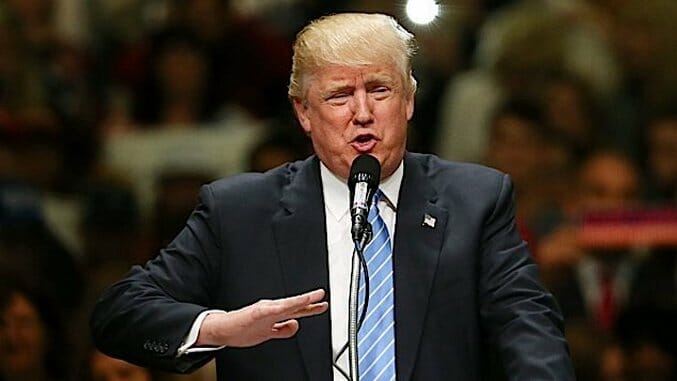Trumponomics: The Plan as Thin-Skinned, and Impractical, As Its Namesake
Photo courtesy of Getty
Let’s stop kidding ourselves. The divide between Democrats and Republicans is no longer between big and small government, or between planned and unplanned economies. It hasn’t been for a long time. It’s about what kind of big government and planned economy the rest of us are going to have to deal with. To add insult to injury, we are now under the leadership of someone who wants a government as big as he tried to convince America his own penis was on a nationally televised debate.
Regardless of your opinion on Reagan and the GOP of the 80s, let’s give credit where credit is due. They had a much more understandable and consistent economic vision than the Trumpists. It isn’t just Trump, either. The GOP is only the “small government / free market party” these days when it’s convenient for them: usually, whenever Barack Obama tried to grow the size of government in a direction they didn’t like. Trump’s merely solidified the mold of corporatism and upward redistribution that’s been the GOP’s economic mandate since at least the new millennium’s beginning.
Ronald Reagan said, “Government’s view of the economy could be summed up in a few short phrases: If it moves, tax it. If it keeps moving, regulate it. And if it stops moving, subsidize it.” It’s the third part of this equation where we really see a break between yesterday and today’s GOP. As Trump’s Carrier deal made clear and as his tweets about Boeing solidified, his will be an administration of subsidization for the elect and punishment for the reprobate. Under his leadership, he’s assured us all the taxes are going down and the regulations are going away. But are they really?
He says he’ll place a 35% tariff on companies who move jobs abroad. His opposition to the TPP and his overall attitude on trade is anti-free-market. He hopes to spend a trillion dollars on infrastructure with the widespread support of a party who viciously critiqued Obama’s similarly priced stimulus package in the midst of the, say it with me, worst financial crisis since the Great Depression. He’s also floated that the rich will pay more in taxes under his administration but anyone who doesn’t own a “Make America Great Again” hat is rightfully responding, “Yeah, right,” to that.
In other words, Trump is getting rid of regulations but not because of a philosophical commitment to economically libertarian principles. He’s getting rid of them because he wants to be the sole regulator of the American economy, the arbiter of who gets to play on the board of a domestic and global economy. Why would he want anything else? He can spearhead economic smear campaigns with the post of a tweet. We’ve already seen a prominent company lose value and a union leader get death threats because of things he’s said and he hasn’t even taken office yet. Make no mistake: Trump only wants an unplanned, unregulated economy as long as he gets to (un)plan and (de)regulate it just the way he likes it.
-

-

-

-

-

-

-

-

-

-

-

-

-

-

-

-

-

-

-

-

-

-

-

-

-

-

-

-

-

-

-

-

-

-

-

-

-

-

-

-








































